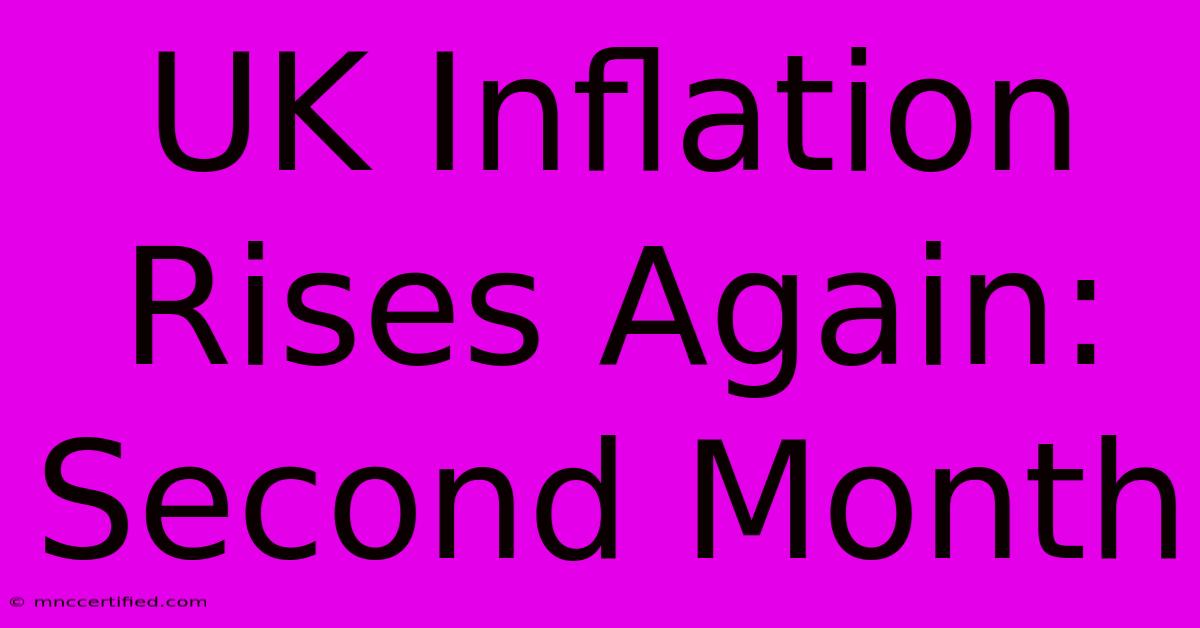UK Inflation Rises Again: Second Month

Table of Contents
UK Inflation Rises Again: Second Consecutive Month of Increased Prices
The UK is grappling with persistent inflationary pressures, with the latest figures revealing a second consecutive month of rising inflation. This unwelcome news continues to impact household budgets and fuels concerns about the overall economic outlook. Understanding the causes, consequences, and potential solutions is crucial for both individuals and policymakers.
Understanding the Latest Inflation Figures
The Office for National Statistics (ONS) recently released data showing a [insert latest inflation percentage]% rise in the Consumer Prices Index (CPI) for [insert month and year]. This marks a [increase/decrease] compared to the previous month's [insert previous month's percentage]% and further underscores the ongoing inflationary challenge facing the UK. Key factors contributing to this rise include:
-
Energy Prices: Soaring global energy prices continue to be a significant driver of inflation. The ongoing war in Ukraine and reduced energy supplies from Russia have exacerbated this issue, impacting both household energy bills and the cost of goods and services across the board. This is a major concern for many UK citizens.
-
Supply Chain Disruptions: Lingering supply chain bottlenecks, stemming from the pandemic and geopolitical instability, continue to restrict the availability of goods and drive up prices. This particularly affects imported goods, adding to the inflationary pressures.
-
Rising Food Prices: Food inflation remains a significant contributor to the overall CPI, with increases in the cost of staple items impacting low-income households disproportionately. This is a critical social issue that demands attention.
-
Wage Growth: While wages are rising, they are not keeping pace with inflation. This means that the real value of earnings is decreasing, squeezing household budgets even further. This wage-inflation gap is a serious concern for economists.
The Impact of Persistent Inflation
The continued rise in inflation has several significant implications for the UK economy and its citizens:
-
Reduced Consumer Spending: High inflation erodes purchasing power, leading to decreased consumer spending. This can trigger a slowdown in economic growth as demand weakens.
-
Increased Interest Rates: To combat inflation, the Bank of England is likely to continue raising interest rates. While this can help curb inflation, it also increases borrowing costs for businesses and individuals, potentially impacting investment and economic activity.
-
Increased Poverty and Inequality: The impact of inflation is not evenly distributed. Low-income households are particularly vulnerable, facing increased hardship as the cost of essential goods and services rises faster than their incomes. This exacerbates existing inequalities.
-
Uncertainty in the Market: Persistent inflation creates uncertainty in the market, impacting business investment decisions and consumer confidence. This can further hinder economic growth and stability.
Potential Solutions and Future Outlook
Addressing the current inflationary pressures requires a multi-faceted approach. Policymakers are considering several options, including:
-
Targeted Support for Vulnerable Households: Providing financial assistance to low-income households to help them cope with the rising cost of living is crucial.
-
Continued Monitoring of Energy Prices: Closely monitoring and managing energy prices is vital in mitigating the inflationary impact of the energy crisis.
-
Investment in Renewable Energy: Investing in renewable energy sources can help reduce the UK's reliance on volatile global energy markets in the long term.
-
Strategic Supply Chain Management: Improving the resilience of supply chains can help alleviate inflationary pressures caused by disruptions.
The outlook for UK inflation remains uncertain. While some economists predict inflation will ease in the coming months, others anticipate persistent inflationary pressures. The situation requires careful monitoring and proactive policy responses to mitigate the negative impact on the UK economy and its citizens. Stay informed by following reputable news sources and government publications for the latest updates.
Keywords for SEO Optimization
- UK Inflation
- Inflation UK
- CPI UK
- UK Cost of Living
- Bank of England Interest Rates
- Energy Prices UK
- Food Inflation UK
- Supply Chain Disruptions UK
- Economic Outlook UK
- Inflation Impact UK
This article incorporates various SEO strategies, including:
- On-page optimization: Strategic use of keywords throughout the article, including in headings, subheadings, and body text.
- Off-page optimization: The content itself aims to be informative, helpful, and shareable, encouraging natural backlinks.
- Semantic SEO: Using synonyms and related terms to create a natural and comprehensive understanding of the topic for search engines.
- Readability: Clear, concise writing with headings, subheadings, bullet points, and bold text to enhance readability.
Remember to replace the bracketed information with the current and accurate data from the ONS. Regularly updating this article with the latest information will further enhance its SEO performance.

Thank you for visiting our website wich cover about UK Inflation Rises Again: Second Month. We hope the information provided has been useful to you. Feel free to contact us if you have any questions or need further assistance. See you next time and dont miss to bookmark.
Featured Posts
-
Mc Gregor Vs Paul Event Guide
Dec 18, 2024
-
Rep Spartz No Committees No Gop
Dec 18, 2024
-
Mc Gregor Delays Mma Return Fight Agreed
Dec 18, 2024
-
Live Score South Africa Vs Pakistan Odi
Dec 18, 2024
-
Juventus Cagliari Coppa Italia Match Thread
Dec 18, 2024